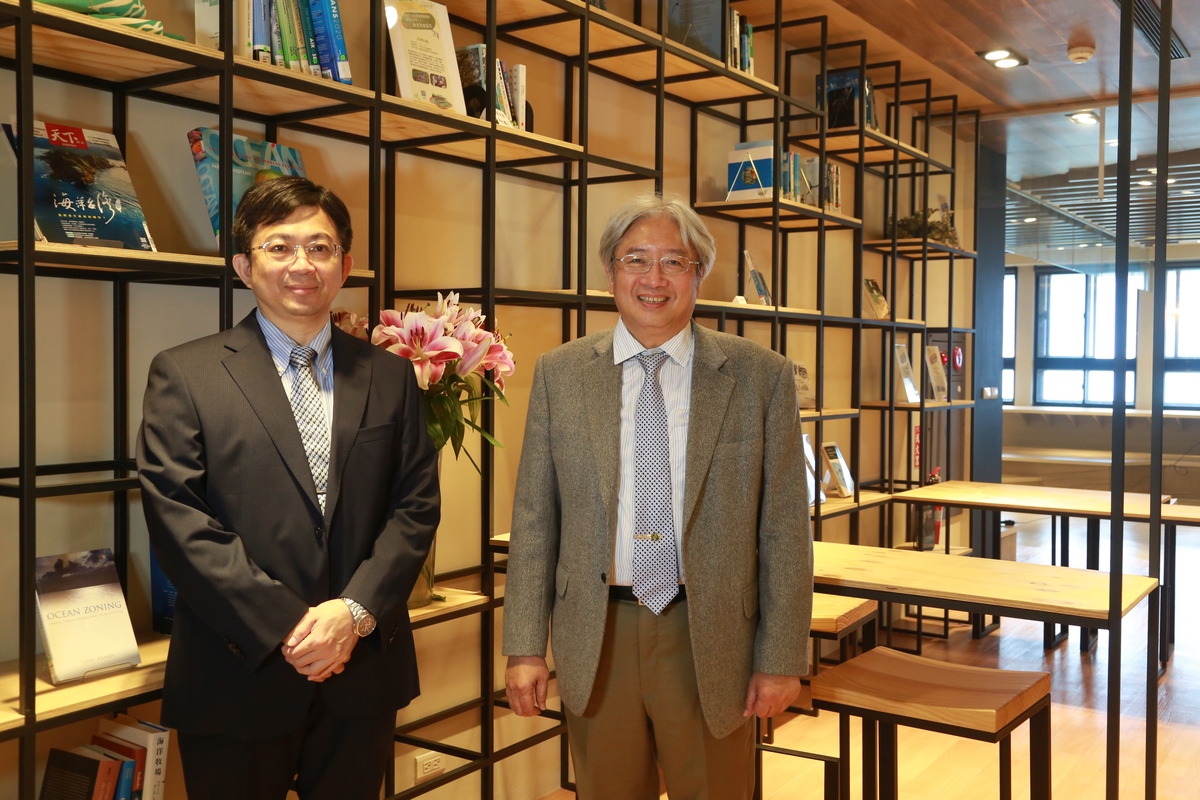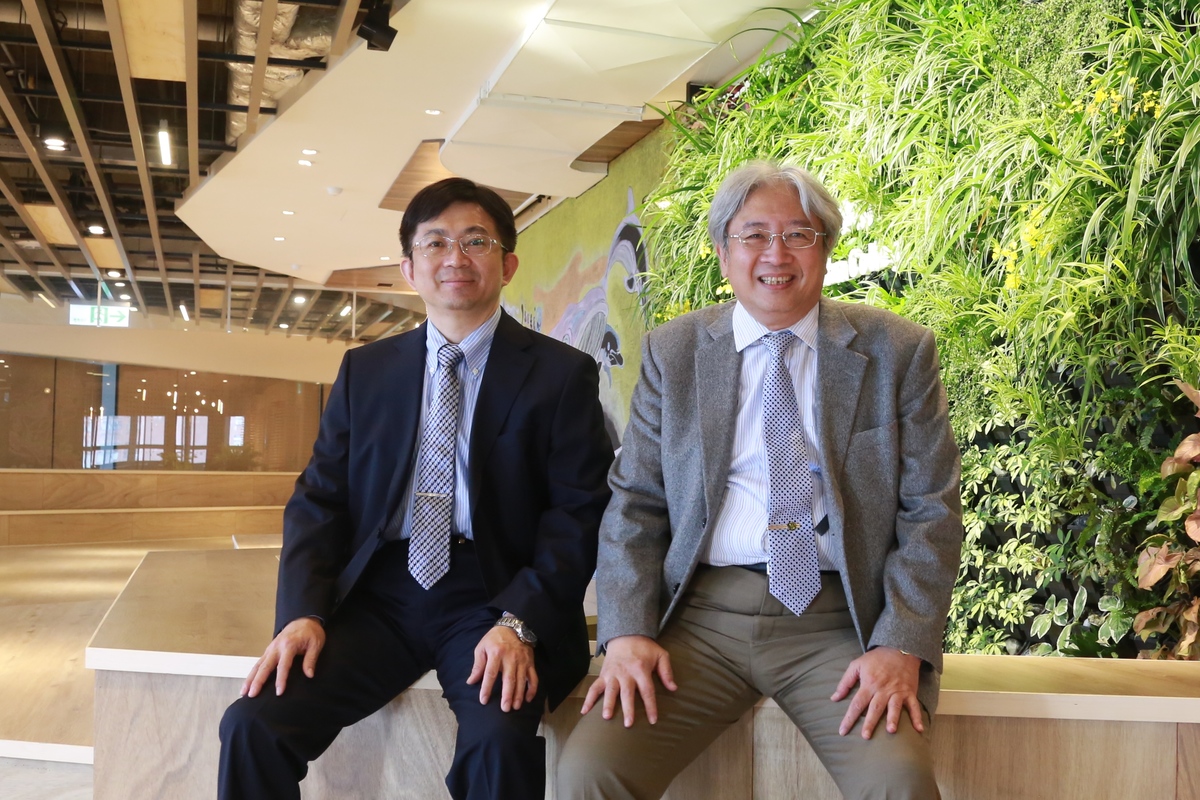Dean of the College of Engineering and Professor of the Institute of Communications Engineering Chih-Peng Li and Professor of the Department of Chemistry Jentaie Shiea receive the Outstanding Research Award


Dean of the College of Engineering and Professor of the Institute of Communications Engineering Chih-Peng Li and Professor of the Department of Chemistry Jentaie Shiea won the 2019 Outstanding Research Award of the Ministry of Science and Technology. Professor Chih-Peng Li specializes in wireless communication, sequential design, digital signal processing, and computer network. In 2019, he became an IEEE Fellow in the category of Research Engineer/Scientist. Professor Jentaie Shiea has devoted his research to the development of new mass spectrometric technologies for food safety, medicine and pharmacology, forensic science, antidrug, antiterrorism, and environmental chemistry. He is a fellow of the Royal Society of Chemistry, and some of the notable awards he has received include the Outstanding Research Award from the National Science Council and Outstanding Technology Transfer Award and Future Tech’s Breakthrough Awards from the Ministry of Science and Technology.
Sequences with ideal periodic auto-correlation functions have multiple and important applications in telecommunication systems, thus they were also called ‘perfect sequences’. Over the last years, research in this field mostly concentrated on the construction of new sequences. Professor Chih-Peng Li was the first scholar to investigate different mathematical properties of the perfect sequences (2007 IEEE IT). Previous studies on perfect sequences chiefly concentrated on polyphase sequences, with the most famous one being the Zadoff-Chu sequence (IEEE IT 1962) adopted in the fourth generation cellular systems (4G). Regarding the integer sequences, the only sequence currently known is the two-dimensional sequence (1,1,1,-1) of length 4. Longer two-dimensional integer sequences were extensively searched by computers, yet unsuccessfully. Thus, in the past decades, there has been no major progress in this field.
Professor Chih-Peng Li was the first scientist who proposed the systematic structure of the perfect Gaussian integer sequences. The first research paper on this topic was published by Professor Li (2011 IEEE ICC, 2012 IEEE TSP). In addition, Professor Li also used Finite Field theory to construct the perfect Gaussian integer sequences of arbitrary composite lengths, and the results were published in the top journal in communications theory (2015 IEEE IT). In addition to academic research, Professor Li has served as the reviewer/chairman for many domestic or international organizations/ministries such as the European Commission, the Ministry of Economic Affairs, the Ministry of Transportation, the Ministry of Science and Technology, the Ministry of Education, etc. Professor Li has hosted several large-scale research projects and organized many domestic and international conferences. He has also guided students to obtain various awards more than 40 times, making outstanding contributions to talent cultivation.
The research in Professor Jentaie Shiea’s laboratory focuses on the development of ambient ionization mass spectrometry and its applications in food and drug safety, precision medicine, drug analysis, forensic sciences, antiterrorism, and environmental chemistry. Professor Shiea has also used modern mass spectrometry for characterizing disease biomarkers in various biological fluids for clinical tests, as well as for mass spectrometry imaging technology in biomedical research. In the past decade, he has actively participated in and promoted research in mass spectrometry, not only in Taiwan but throughout Asia and beyond. Previously, Professor Shiea was a board member and the representative for the Asia-Pacific Region in the International Mass Spectrometry Foundation (2009-2016), served as the Chairperson of the Taiwan Society for Mass Spectrometry (2009-2012) and founded two international conferences: Asia-Oceania Mass Spectrometry Conference (from 2010 until now) and Mass Spectrometry for Clinical Diagnosis (from 2014 until now). Last year, his laboratory collaborated with the Shimadzu Corporation, Taiwan, in establishing the Joint Laboratory of Mass Spectrometry Technology; this was the first time a mass spectrometry laboratory was jointly established by the industry and an academic institution in Taiwan.
Professor Shiea has been researching mass spectrometry for decades. He has received recognition for his research achievements both in Taiwan and abroad, such as the Outstanding Research Award by the National Science Council in 2009; the National Innovation and Creation Award by the Ministry of Economic Affairs in 2010; the Chemical Technology Award of the Chemical Society Located in Taipei in 2011; the Y. Z. Hsu Science Award by the Far Eastern Y. Z. Hsu Science and Technology Memorial Foundation in 2012; the Outstanding Reviewer Award by the American Society of Mass Spectrometry in 2013; the Outstanding Research Scholar Award by the Taiwan Society for Mass Spectrometry in 2013; the Award of Outstanding Technology Transfer by the Ministry of Science and Technology in 2016; and the Future Tech Breakthrough Award by the Ministry of Science and Technology in 2017 and 2019.
Note:
The Outstanding Research Award is an award conferred by the Ministry of Science and Technology to outstanding researchers for their achievements in the fields of science and technology, encouraging them to continue doing basic or applied long-term research, improve the standards of academic research in Taiwan and its international academic status, contribute to social development and industry, and reinforce Taiwan’s technological strength. Applicants must abide by the requirements of supervisors of the case projects which are supported by the Ministry of Science and Technology, and basic research results should have academically significant or novel value. Applied research results should constitute a significant contribution to and provide concrete, innovative, and valuable technologies for the economy, society, societal well-being and knowledge, environmental sustainability, or industry. In 2019, the Award was conferred to 76 scholars and researchers.
Sequences with ideal periodic auto-correlation functions have multiple and important applications in telecommunication systems, thus they were also called ‘perfect sequences’. Over the last years, research in this field mostly concentrated on the construction of new sequences. Professor Chih-Peng Li was the first scholar to investigate different mathematical properties of the perfect sequences (2007 IEEE IT). Previous studies on perfect sequences chiefly concentrated on polyphase sequences, with the most famous one being the Zadoff-Chu sequence (IEEE IT 1962) adopted in the fourth generation cellular systems (4G). Regarding the integer sequences, the only sequence currently known is the two-dimensional sequence (1,1,1,-1) of length 4. Longer two-dimensional integer sequences were extensively searched by computers, yet unsuccessfully. Thus, in the past decades, there has been no major progress in this field.
Professor Chih-Peng Li was the first scientist who proposed the systematic structure of the perfect Gaussian integer sequences. The first research paper on this topic was published by Professor Li (2011 IEEE ICC, 2012 IEEE TSP). In addition, Professor Li also used Finite Field theory to construct the perfect Gaussian integer sequences of arbitrary composite lengths, and the results were published in the top journal in communications theory (2015 IEEE IT). In addition to academic research, Professor Li has served as the reviewer/chairman for many domestic or international organizations/ministries such as the European Commission, the Ministry of Economic Affairs, the Ministry of Transportation, the Ministry of Science and Technology, the Ministry of Education, etc. Professor Li has hosted several large-scale research projects and organized many domestic and international conferences. He has also guided students to obtain various awards more than 40 times, making outstanding contributions to talent cultivation.
The research in Professor Jentaie Shiea’s laboratory focuses on the development of ambient ionization mass spectrometry and its applications in food and drug safety, precision medicine, drug analysis, forensic sciences, antiterrorism, and environmental chemistry. Professor Shiea has also used modern mass spectrometry for characterizing disease biomarkers in various biological fluids for clinical tests, as well as for mass spectrometry imaging technology in biomedical research. In the past decade, he has actively participated in and promoted research in mass spectrometry, not only in Taiwan but throughout Asia and beyond. Previously, Professor Shiea was a board member and the representative for the Asia-Pacific Region in the International Mass Spectrometry Foundation (2009-2016), served as the Chairperson of the Taiwan Society for Mass Spectrometry (2009-2012) and founded two international conferences: Asia-Oceania Mass Spectrometry Conference (from 2010 until now) and Mass Spectrometry for Clinical Diagnosis (from 2014 until now). Last year, his laboratory collaborated with the Shimadzu Corporation, Taiwan, in establishing the Joint Laboratory of Mass Spectrometry Technology; this was the first time a mass spectrometry laboratory was jointly established by the industry and an academic institution in Taiwan.
Professor Shiea has been researching mass spectrometry for decades. He has received recognition for his research achievements both in Taiwan and abroad, such as the Outstanding Research Award by the National Science Council in 2009; the National Innovation and Creation Award by the Ministry of Economic Affairs in 2010; the Chemical Technology Award of the Chemical Society Located in Taipei in 2011; the Y. Z. Hsu Science Award by the Far Eastern Y. Z. Hsu Science and Technology Memorial Foundation in 2012; the Outstanding Reviewer Award by the American Society of Mass Spectrometry in 2013; the Outstanding Research Scholar Award by the Taiwan Society for Mass Spectrometry in 2013; the Award of Outstanding Technology Transfer by the Ministry of Science and Technology in 2016; and the Future Tech Breakthrough Award by the Ministry of Science and Technology in 2017 and 2019.
Note:
The Outstanding Research Award is an award conferred by the Ministry of Science and Technology to outstanding researchers for their achievements in the fields of science and technology, encouraging them to continue doing basic or applied long-term research, improve the standards of academic research in Taiwan and its international academic status, contribute to social development and industry, and reinforce Taiwan’s technological strength. Applicants must abide by the requirements of supervisors of the case projects which are supported by the Ministry of Science and Technology, and basic research results should have academically significant or novel value. Applied research results should constitute a significant contribution to and provide concrete, innovative, and valuable technologies for the economy, society, societal well-being and knowledge, environmental sustainability, or industry. In 2019, the Award was conferred to 76 scholars and researchers.
Click Num:
Share
